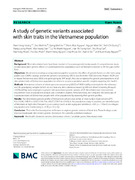A study of genetic variants associated with skin traits in the Vietnamese population

View/
Date
2024-01-11Author
Hoang, Tham Hong
Vu, Duc Minh
Vu, Giang Minh
Nguyen, Thien Khac
Do, Nguyet Minh
Duong, Vinh Chi
Pham, Thang Luong
Tran, Mai Hoang
Khanh Nguyen, Ly Thi
Han, Han Thi Tuong
Can, Thu Thuy
Pham, Thai Hong
Pham, Tho Duc
Nguyen, Thanh Hong
Do, Huy Phuoc
Vo, Nam S.
Nguyen, Xuan Hung
Metadata
Show full item recordAbstract
Background: Most skin-related traits have been studied in Caucasian genetic backgrounds. A comprehensive study on skin-associated genetic effects on underrepresented populations such as Vietnam is needed to fill the gaps in the field.
Objectives: We aimed to develop a computational pipeline to predict the effect of genetic factors on skin traits using public data (GWAS catalogs and whole-genome sequencing (WGS) data from the 1000 Genomes Project-1KGP) and in-house Vietnamese data (WGS and genotyping by SNP array). Also, we compared the genetic predispositions of 25 skin-related traits of Vietnamese population to others to acquire population-specific insights regarding skin health.
Methods: Vietnamese cohorts of whole-genome sequencing (WGS) of 1008 healthy individuals for the reference and 96 genotyping samples (which do not have any skin cutaneous issues) by Infinium Asian Screening Array-24 v1.0 BeadChip were employed to predict skin-associated genetic variants of 25 skin-related and micronutrient requirement traits in population analysis and correlation analysis. Simultaneously, we compared the landscape of cutaneous issues of Vietnamese people with other populations by assessing their genetic profiles.
Results: The skin-related genetic profile of Vietnamese cohorts was similar at most to East Asian cohorts (JPT: Fst = 0.036, CHB: Fst = 0.031, CHS: Fst = 0.027, CDX: Fst = 0.025) in the population study. In addition, we identified pairs of skin traits at high risk of frequent co-occurrence (such as skin aging and wrinkles (r = 0.45, p = 1.50e-5) or collagen degradation and moisturizing (r = 0.35, p = 1.1e-3)).
Conclusion: This is the first investigation in Vietnam to explore genetic variants of facial skin. These findings could improve inadequate skin-related genetic diversity in the currently published database.
